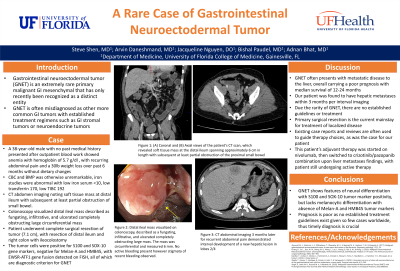Tuesday Poster Session
Category: Small Intestine
P4151 - A Rare Case of Gastrointestinal Neuroectodermal Tumor
Tuesday, October 24, 2023
10:30 AM - 4:00 PM PT
Location: Exhibit Hall

Has Audio
- SS
Steve Shen, MD
University of Florida
Gainesville, FL
Presenting Author(s)
Steve Shen, MD, Arvin Daneshmand, MD, Jacqueline Nguyen, DO, Bishal Paudel, MD, Adnan Bhat, MD
University of Florida, Gainesville, FL
Introduction: Gastrointestinal (GI) neuroectodermal tumor (GNET) is an extremely rare primary malignant GI mesenchymal tumor that has only recently been recognized as a distinct entity. GNET is often misdiagnosed as other more common GI tumors with established treatment strategies such as GI stromal tumors or neuroendocrine tumors. GNET shows features of neural differentiation with S100 and SOX-10 positivity, but lacks melanocytic differentiation with absence of Melan-A or HMB45 markers. Prognosis is poor as no established treatment guidelines exist given so few number of GNET cases reported worldwide, with less than 150 reported cases to date. Here we discuss a rare case of GNET.
Case Description/Methods: A 38-year-old male with no significant past medical history presented for hospital evaluation after routine office blood work revealed anemia with hemoglobin of 5.7 g/dl, accompanied with recurring abdominal pain and a 30 kg weight loss over six months without dietary changes. Colonoscopy revealed a 7 cm fungating ulcerating mass in the distal ileum. He underwent total surgical resection of the tumor. Per immunohistochemistry, the tumor cells were positive for S100 and SOX-10, negative for Melan-A and HMB45, with fluorescence in situ hybridization detecting an EWSR1-ATF1 gene fusion, all of which met diagnostic criteria for a GNET. Whole body PET-CT showed a hepatic lesion which was concerning for metastatic disease. Adjuvant therapy was initially started with nivolumab, then transitioned to crizotinib and pazopanib combination after subsequent disease progression was found with liver metastasis growth, for which the patient then underwent a successful Y90 radioembolization treatment of the hepatic lesion.
Discussion: GNET often presents with metastatic disease to the liver, overall carrying a poor prognosis with median survival of 12-24 months. Due to its rarity, there are no established guidelines for treatment of GNET. Primary surgical resection is currently the mainstay of curative treatment for localized disease. Various regimens of targeted therapy, immunotherapy, and chemotherapy have been used as adjuvant and metastatic therapy with variable outcomes. Existing case reports and reviews are often used to guide therapy choice, as was the case for our patient. Awareness of this rare disease and understanding of its diagnostic criteria is crucial to initiate timely management.

Disclosures:
Steve Shen, MD, Arvin Daneshmand, MD, Jacqueline Nguyen, DO, Bishal Paudel, MD, Adnan Bhat, MD. P4151 - A Rare Case of Gastrointestinal Neuroectodermal Tumor, ACG 2023 Annual Scientific Meeting Abstracts. Vancouver, BC, Canada: American College of Gastroenterology.
University of Florida, Gainesville, FL
Introduction: Gastrointestinal (GI) neuroectodermal tumor (GNET) is an extremely rare primary malignant GI mesenchymal tumor that has only recently been recognized as a distinct entity. GNET is often misdiagnosed as other more common GI tumors with established treatment strategies such as GI stromal tumors or neuroendocrine tumors. GNET shows features of neural differentiation with S100 and SOX-10 positivity, but lacks melanocytic differentiation with absence of Melan-A or HMB45 markers. Prognosis is poor as no established treatment guidelines exist given so few number of GNET cases reported worldwide, with less than 150 reported cases to date. Here we discuss a rare case of GNET.
Case Description/Methods: A 38-year-old male with no significant past medical history presented for hospital evaluation after routine office blood work revealed anemia with hemoglobin of 5.7 g/dl, accompanied with recurring abdominal pain and a 30 kg weight loss over six months without dietary changes. Colonoscopy revealed a 7 cm fungating ulcerating mass in the distal ileum. He underwent total surgical resection of the tumor. Per immunohistochemistry, the tumor cells were positive for S100 and SOX-10, negative for Melan-A and HMB45, with fluorescence in situ hybridization detecting an EWSR1-ATF1 gene fusion, all of which met diagnostic criteria for a GNET. Whole body PET-CT showed a hepatic lesion which was concerning for metastatic disease. Adjuvant therapy was initially started with nivolumab, then transitioned to crizotinib and pazopanib combination after subsequent disease progression was found with liver metastasis growth, for which the patient then underwent a successful Y90 radioembolization treatment of the hepatic lesion.
Discussion: GNET often presents with metastatic disease to the liver, overall carrying a poor prognosis with median survival of 12-24 months. Due to its rarity, there are no established guidelines for treatment of GNET. Primary surgical resection is currently the mainstay of curative treatment for localized disease. Various regimens of targeted therapy, immunotherapy, and chemotherapy have been used as adjuvant and metastatic therapy with variable outcomes. Existing case reports and reviews are often used to guide therapy choice, as was the case for our patient. Awareness of this rare disease and understanding of its diagnostic criteria is crucial to initiate timely management.

Figure: Terminal ileum GNET on colonoscopy
Disclosures:
Steve Shen indicated no relevant financial relationships.
Arvin Daneshmand indicated no relevant financial relationships.
Jacqueline Nguyen indicated no relevant financial relationships.
Bishal Paudel indicated no relevant financial relationships.
Adnan Bhat indicated no relevant financial relationships.
Steve Shen, MD, Arvin Daneshmand, MD, Jacqueline Nguyen, DO, Bishal Paudel, MD, Adnan Bhat, MD. P4151 - A Rare Case of Gastrointestinal Neuroectodermal Tumor, ACG 2023 Annual Scientific Meeting Abstracts. Vancouver, BC, Canada: American College of Gastroenterology.
